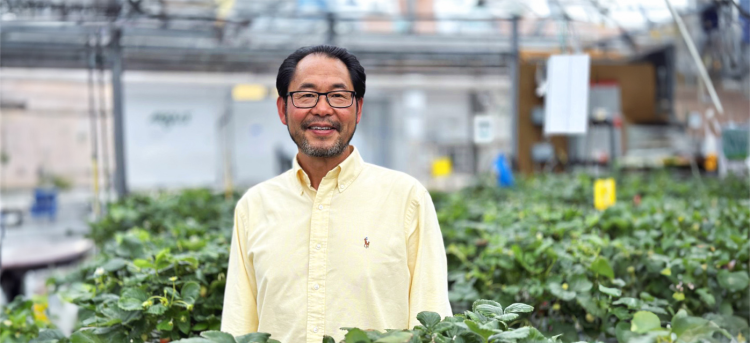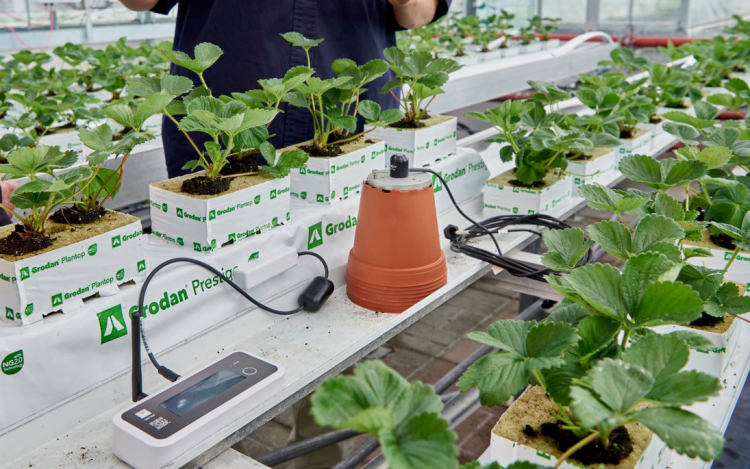A University of Guelph research team has made it to the third and final Scaling Phase of the Weston Family Foundation's $33-million Homegrown Innovation Challenge.
Dr. Youbin Zheng, professor in the School of Environmental Sciences, Ontario Agricultural College, and his team are receiving nearly $5 million to scale a hybrid greenhouse-vertical farming system powered by artificial intelligence (AI) and smart sensor technology that can grow strawberries year-round.

Dr. Youbin Zhenga developed a hybrid greenhouse-vertical farming system powered by artificial intelligence (AI) that can grow strawberries year-round
"Our technologies are designed to optimize growing conditions in greenhouses," says Zheng. "They will allow us to produce strawberries out of season, use less energy, save resources and increase production and efficiency with a lower environmental impact."
The Homegrown Innovation Challenge is supporting Canada's ecosystem of local talent to accelerate our path to leadership in agriculture. The solutions developed through this initiative will help make our national food supply chain more resilient and transform the future of food production across the country.
"Supporting the resilience, sustainability and self-sufficiency of Canada's food systems has never been more important," says Dr. Shayan Sharif, interim vice-president, research and innovation. "We are delighted to see Dr. Zheng and his team advance their innovations in this next phase of the Challenge."
Scaling up the smart greenhouse technologies
Zheng and his team, including researchers from Agriculture and Agri-Food Canada (AAFC) and the AI Lab at the University of Guelph, have been selected as one of four teams to compete in the Challenge's Scaling Phase.
They will take from the previous Shepherd Phase their three AI-driven technologies - a smart, electricity price-based lighting control system; a net-zero, climate-controlled greenhouse vertical growing system; and an autonomous rootzone management system - and integrate them at a commercial scale to showcase their value to producers.

"Until now, we've been testing our systems in small-scale greenhouses at the University and AAFC," says Zheng. "The next step is collaborating with leading industry partners, including automated technology suppliers like Hoogendorn America, and integrating our technologies into their existing commercial systems. Once our technologies have been demonstrated in commercial greenhouses, they can be translated across Canada and internationally."
Of the four Scaling Phase teams, one or two teams will be named Challenge winners and receive a grand prize of $1 million.
Zheng says if his team were to win the Challenge, he would feel very proud that their work can help provide Canadians with fresh, nutritious, locally grown fruits and vegetables throughout the year.
"We always find it rewarding when our research has impact in the real world," says Zheng. "Especially at this moment, when we are facing big challenges like climate change and shifting trade dynamics, using controlled environment agriculture to produce fresh produce locally is becoming even more important for Canada. We're proud to be able to do something good for our whole population and for the environment at the same time."
In addition to AAFC and Hoogendorn, other collaborators are South Essex Fabrication - Center for Horticultural Innovation, Sollum Technologies, Climate Control Systems, the Ontario Ministry of Agriculture, Food and Agribusiness (OMAFA), Meteor Systems - North America and the University of Windsor.
About the Homegrown Innovation Challenge
The Homegrown Innovation Challenge supports the development of sustainable, scalable approaches to growing berries year-round using controlled environment agriculture. While focused on berries, these innovations could be used to grow a wider variety of fruits and vegetables out of season, strengthening Canada's food system for the long term.
The Weston Family Foundation takes a collaborative approach to philanthropy and aspires to provide more than funding. To ensure that their grants have tangible, lasting impacts, the Foundation's goal is to build partnerships with forward-thinking leaders across the country and provide non-financial support to grantees.
The Scaling Phase of the Homegrown Innovation Challenge reflects this commitment in action by supporting the Canadian-led teams as they turn concepts into real-world solutions via mentorship, networking and communications.












